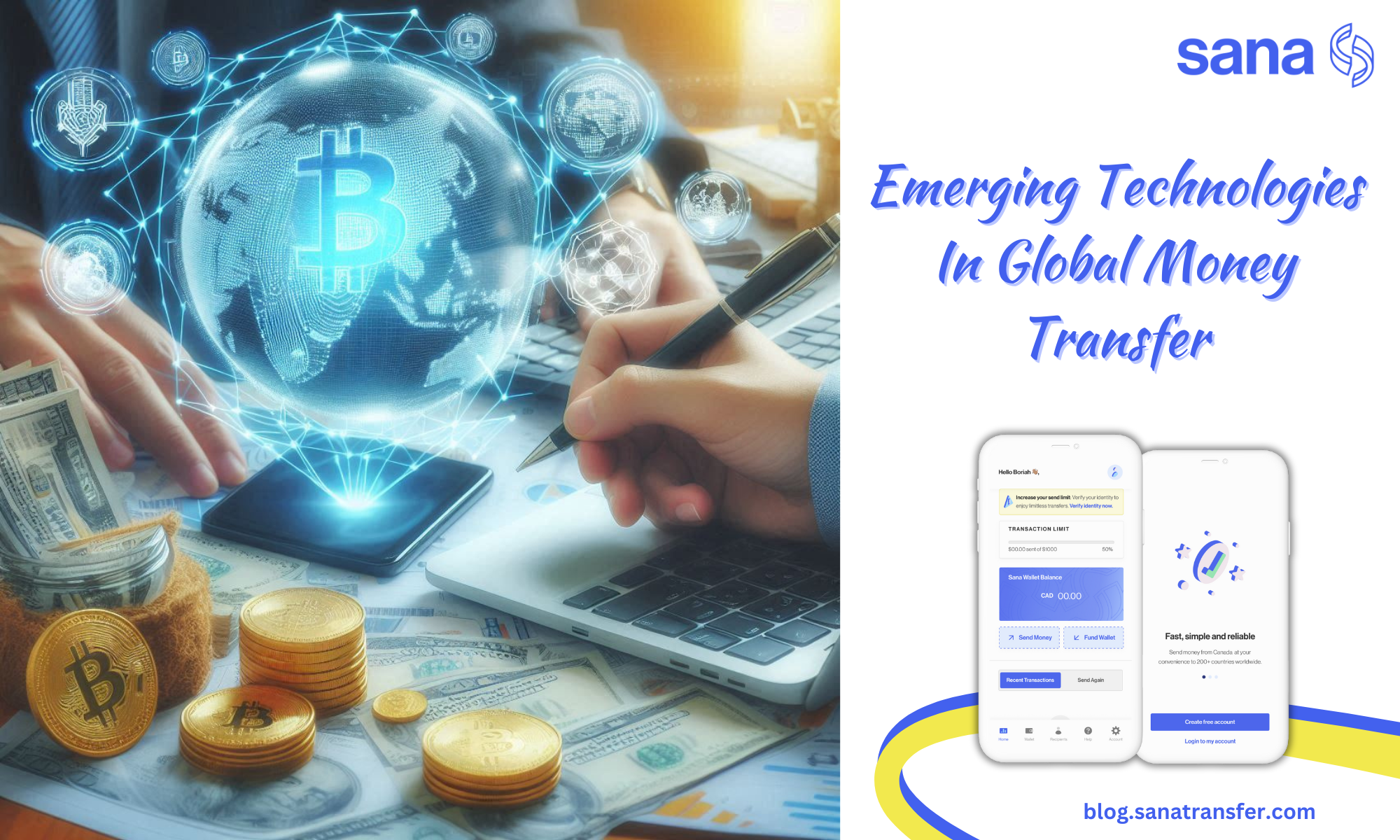Emerging Technologies In Global Money Transfer

When looking at emerging technologies in global money transfers, it is worth understanding that for decades, people found it hard to send money across borders to their loved ones and business partners. The process was a slow, expensive, and inconvenient one as traditional methods, like bank wire transfers, often involved multiple intermediaries and lengthy wait times. These intermediaries charged hefty fees and the long waiting times created significant problems for people who rely on international money transfers, such as immigrants supporting families back home or businesses conducting international transactions.
In recent times, the tides have turned as there is more demand for faster, cheaper, and more accessible cross-border payments. Fueled by globalisation and the rise of the digital age, people expect a more streamlined experience when managing their finances internationally.
Thankfully, emerging technologies are revolutionising the global money transfer industry. From blockchain and cryptocurrencies to artificial intelligence, these innovations are paving the way for a future where sending money across borders is as easy and instant as sending a text message.
What Are The Key Emerging Technologies In Global Money Transfer?
Three key technologies are revolutionising global money transfer. They include:
A. Blockchain Technology
Blockchain technology is one of the emerging technologies in global money transfer. It is basically a shared record book, accessible to everyone, where every transaction is meticulously documented and permanently locked in place. It functions as a distributed ledger, meaning copies of this record book are spread across a vast network of computers, eliminating the need for a single, centralised authority.
The decentralisation of Blockchain offers several advantages to the world of money transfer including:
- Security: Any attempt to tamper with a record would require altering all subsequent entries across the entire network, making it virtually impossible to forge transactions.
- Transparency: Everyone can see every transaction, fostering trust and accountability.
Read Also: Optimising International Money Transfers As Eid al-Adha Approaches
How Does Blockchain Technology Streamline Global Money Transfer?
Traditionally, banks act as intermediaries, verifying and settling transactions, which can be time-consuming. Blockchain comes in handy, eliminating these intermediaries and allowing for:
- Direct peer-to-peer transfers, which reduce intermediaries and significantly lower fees.
- Faster settlements as transactions can be verified and settled almost instantly, compared to the days it can take with traditional methods; and also opening up the system to underbanked regions.
B. Cryptocurrencies and Stablecoins
Now that cryptocurrencies like Bitcoin are popular, it is worth mentioning that they . They can be used for global money transfers, offering advantages like:
- Borderless Transactions: Cryptocurrencies transcend geographic boundaries, making them ideal for international payments.
However, cryptocurrencies also come with challenges:
- Volatility: Their value can fluctuate significantly, making them risky for some remittance needs.
To address this volatility, stablecoins have emerged. These are cryptocurrencies pegged to a stable asset, like the US dollar, aiming to maintain a constant value. Stablecoins offer the benefits of cryptocurrencies (speed, security) with reduced volatility, making them more suitable for remittances.
Regulations surrounding cryptocurrency use in remittances are still evolving, creating some uncertainty for businesses and consumers.
Read Also: Optimising Money Transfer to War-Torn Countries
C. Artificial Intelligence (AI) and Machine Learning (ML)
Presently, Artificial Intelligence and machine learning (ML) are transforming remittance platforms. They have been instrumental in streamlining the money transfer processes, enhancing security, and improving efficiency in the following ways:
- Fraud Detection: AI algorithms can analyse vast amounts of transaction data to identify suspicious patterns indicative of fraud. This helps remittance platforms prevent fraudulent transactions and protect consumers' hard-earned money.
- Risk Management: ML models can assess the risk associated with a remittance based on various factors. This allows platforms to implement appropriate security measures, such as additional verification for high-risk transactions.
- These AI/ML advancements benefit both consumers and businesses:
- Consumers: AI-powered platforms can process remittances faster, leading to quicker delivery of funds to beneficiaries.
- Businesses: Remittance platforms can leverage AI and ML to reduce operational costs associated with manual processes and fraud prevention.
However, it's crucial to consider potential biases in AI algorithms used in finance. Biases can arise from the data used to train the models, which may lead to unfair or discriminatory outcomes. Ensuring fairness and transparency in AI use is essential for ethical financial practices.
Read Also: Traditional Money Transfer Methods Vs Modern FinTech Methods
What Is The Future Of Global Money Transfer?
Like everything on the earth, the advantages and disadvantages go side-by-side. So does the future of global money transfer.
The Positive Future Of Global Money Transfer
The future of money transfer is one that experts believe is going to be a beautiful blend of the technologies highlighted above. Blockchain technology is there to provide a secure and transparent foundation for transactions, cryptocurrencies and stablecoins facilitate instant cross-border payments, and Artificial Intelligence/Machine Learning act as the intelligent engine driving efficiency and security.
The synergy of these two phenomena is bound to create a more efficient financial system. Blockchain's streamlined architecture will eliminate unnecessary intermediaries, reducing costs for both senders and receivers. Artificial Intelligence/Machine Learning will automate tasks, further reducing processing times and minimising human error.
This will result in faster, cheaper, and more reliable money transfers across the globe.
The impact will be particularly significant for underserved populations as people in developing countries, who rely on remittances will have quicker access to these vital funds.
Blockchain and stablecoins will also be on hand to empower those without traditional bank accounts, fostering financial inclusion.
The Less Attractive side Of The Future Of Money Transfer
As much as money transfers will be made easy and convenient in the future, this brave new world of money transfer comes with a number of challenges:
- Firstly, regulatory frameworks need to evolve to keep pace with technological advancements; and with the pace it is taking; many experts believe that it is too fast to have many organisations keep up with them.
- Governments of the various countries in the world must also create clear regulations for cryptocurrencies and stablecoins to ensure consumer protection and prevent financial crime. Additionally, ensuring the scalability of these technologies is crucial.
- Blockchain networks can currently struggle with high transaction volumes as more and more people use the crypto/blockchain world for more tasks in trade and commerce..
- Continued development is further needed to handle the potential surge in global money transfers.
Despite these challenges, the future of money transfer is undeniably bright. By harnessing the power of emerging technologies, we can create a more efficient, inclusive, and accessible financial system that benefits everyone, from seasoned business executives to migrant workers supporting their families back home, fostering a more connected and financially empowered global community.
Final Words
Now that we have checked out the emerging technologies in global money transfers, we will agree that the traditional money transfer landscape is transforming with these technologies. Blockchain provides secure, transparent transactions, while cryptocurrencies enable instant cross-border payments. AI enhances efficiency and security. This convergence promises faster, cheaper, and more reliable transfers, benefiting individuals, businesses, and underserved populations, particularly in developing countries.
However, challenges remain. Regulatory frameworks must adapt, and scalability issues need addressing. Despite these hurdles, the potential rewards are vast. Emerging technologies can make sending money across borders as seamless as sending a text message, connecting people and economies worldwide more efficiently and inclusively.
When looking for the best international money transfer platform for your business and personal needs, look no further than SanaTransfer and enjoy that much-needed peace of mind and ease of use. We offer the most affordable exchange rates; faster delivery times and security of your funds. Get with us today by registering on our web platform or downloading our Android or iOS Device.
Read Also: Major Problems Online Remittance Platforms Face When Sending Remittances To Southeast Asia
